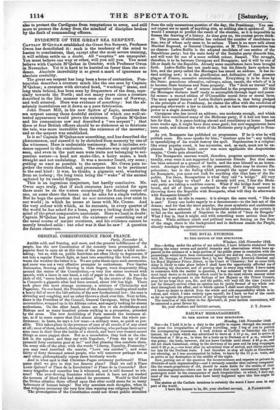EVIDENCE OF THE GREAT SEA SERPENT.
CAPTAIN M'QuasE established the Great Sea Serpent, Professor Owen has demolished it: such is the tendency of the mind to hasten to conclusions, that, except after the most severe training, it will seldom settle on a doubt. All " sceptics " are unpopular. You must believe one way or other, will you nil! you. You must believe with Captain M'Quhae in October, with Professor Owen in November. Yet it is hard to be hurried faster than the evi- dence. Absolute incredulity is as great a mark of ignorance as absolute credulity.
The great sea serpent has long been a bone of contention. Pon- toppidan describes a creature much like the one seen by Captain M'Quhae; a creature with elevated head, " washing " mane, and long train behind, has been seen by frequenters of the deep, espe- cially towards the North ; and not many years since a creature described in the like manner was seen on the coast of Norway, and well attested. Here was evidence of something : but the ab- solutely incredulous set it down as a pure fabrication. John Stuart Mill, in his new System of Logic mentions the sea serpent among those doubtful entities of which one well-at- tested appearance would prove the existence. Captain M'Quhae and his companions saw and described a "sea serpent " : that three or four British officers should be so dishonest as to fabricate the tale, was more incredible than the existence of the monster; and so the serpent was established.
Is it so? Captain M'Quhae saw something, and has described the phtenomenon, and caused it to be sketched from memory by one of the witnesses. Here is undeniable testimony. But it includes evi- dence opposed to the conclusion. The creature was only partially seen, and even in the part seen were traits not belonging to ser- pentine nature—a head not snake-like, a hairy mane, a back straight and not undulating. It was a monster lizard, cry some ; getting as near as possible to the serpent. Mr. Owen puts to- gether the traits described, and pronounces them to be pertinent to the seal kind : it was, he thinks, a gigantic seal, wandering from an iceberg ; the long train being the " wake " of the animal agitated by its caudal flippers. This is an ingenious conjecture, but hardly conclusive. Mr. Owen says truly, that if such creatures have existed for ages there must be on the waters occasionally the floating corpse of one, on some shore the bones ; and he asks for a single vertebra. But he begs the question that no new creatures can ever exist in our world ; in which he seems at issue with Mr. Crosse. And the very ardour with which, as he recounts, in every quarter of the world he has asked for a bone, proves a lurking doubt in the mind of the great comparative anatomist. Here we land in doubt : Captain M'Quhae has proved the existence of something out of the usual course of natant creatures, and his evidence cannot be merely brushed aside : but what was it that he saw ? A question for future observers.


























 Previous page
Previous page